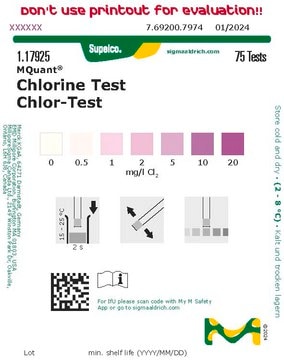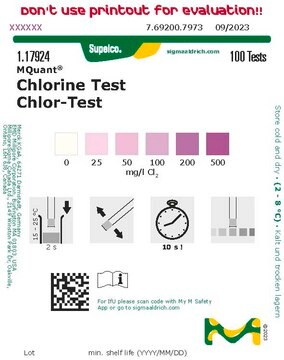1.00599
Chlorine Test, photometric
photometric, 0.010-6.00 mg/L (Cl2), Spectroquant®
About This Item
Produits recommandés
product name
Chlorine Test, photometric, 0.010-6.00 mg/L (Cl2), Spectroquant®
Gamme de produits
Spectroquant®
Niveau de qualité
Utilisation
sufficient for 200 tests ((free chlorine) or 100 (free chlorine) + 100 (total chlorine))
Analyte(s) spécifique(s)
chlorine
Plage de mesure
0.010-6.00 mg/L (Cl2)
Technique(s)
photometry: suitable
Compatibilité
for use with Spectroquant® Move 100
for use with Spectroquant® Move DC
for use with Spectroquant® Nova 60 A
for use with Spectroquant® Prove 100
for use with Spectroquant® Prove 300
for use with Spectroquant® Prove 600
Méthode de détection
photometric (DPD)
Température de stockage
15-25°C
Description générale
This Spectroquant® Chlorine test allows the accurate quantification. Chlorinated disinfectants are still in common use all over the world, their major applications being in the chlorination of drinking water and swimming pools. In weakly acidic solution free chlorine reacts with dipropyl-p-phenylenediamine (DPD) to form a red-violet dye that is determined photometrically. In the presence of potassium iodide, also combined chlorine is measured in this reaction.
The method is analogous to EPA 330.5, APHA 4500-Cl2 G, and DIN EN ISO 7393-2.
All our Cell and Reagent Test Kits are equipped with the unique Live ID (2D barcode) which allows seamless method recognition and contains essential information such as lot number, expiry date, and automatic calibration updates.
The Spectroquant® Reagent Test Kits contain highly stable, ready-to-use reagent mixtures to perform the analysis according to the procedure described in the accompanying instruction leaflet.
Application
- 3,3′,5,5′-tetramethylbenzidine as multi-colorimetric indicator of chlorine in water in line with health guideline values.: This study demonstrates the use of 3,3′,5,5′-tetramethylbenzidine as a colorimetric indicator for detecting chlorine levels in water, providing a cost-effective and simple method for ensuring water safety in compliance with health guidelines (Palladino et al., 2020).
- Analysis of free chlorine in aqueous solution at very low concentration with lateral flow tests.: Investigates the effectiveness of lateral flow assays for the quantification of free chlorine in water, highlighting their potential for quick and accurate chlorine testing in field settings (Schwenke et al., 2019).
- Improved residual chlorine test; the ortho-toluidine: arsenite method for testing water for true, false and chloramine residuals.: Describes a methodological advancement in measuring different forms of chlorine residuals in water, enhancing the accuracy of water quality assessments (GILCREAS FW, 1948).
Informations légales
Mention d'avertissement
Danger
Mentions de danger
Conseils de prudence
Classification des risques
Eye Irrit. 2 - Repr. 1B - STOT RE 2 Oral
Organes cibles
Thyroid
Code de la classe de stockage
6.1D - Non-combustible, acute toxic Cat.3 / toxic hazardous materials or hazardous materials causing chronic effects
Classe de danger pour l'eau (WGK)
WGK 2
Point d'éclair (°F)
Not applicable
Point d'éclair (°C)
Not applicable
Certificats d'analyse (COA)
Recherchez un Certificats d'analyse (COA) en saisissant le numéro de lot du produit. Les numéros de lot figurent sur l'étiquette du produit après les mots "Lot" ou "Batch".
Déjà en possession de ce produit ?
Retrouvez la documentation relative aux produits que vous avez récemment achetés dans la Bibliothèque de documents.
Les clients ont également consulté
Protocoles
Preparation of a standard solution for total chlorine.
Preparation of a standard solution for total chlorine.
Preparation of a standard solution for total chlorine.
Preparation of a standard solution for total chlorine.
Contenu apparenté
Disinfection control solutions ensure food safety and regulatory compliance in food & beverage manufacturing.
Disinfection control solutions ensure food safety and regulatory compliance in food & beverage manufacturing.
Dans l'industrie agro-alimentaire, le contrôle de la désinfection HACCP est critique pour garantir la sécurité des produits et se conformer aux exigences réglementaires. Nous proposons une gamme étendue de produits utilisés dans les procédures de contrôle de l'hygiène et de la désinfection en production de produits alimentaires et de boissons.
Dans l'industrie agro-alimentaire, le contrôle de la désinfection HACCP est critique pour garantir la sécurité des produits et se conformer aux exigences réglementaires. Nous proposons une gamme étendue de produits utilisés dans les procédures de contrôle de l'hygiène et de la désinfection en production de produits alimentaires et de boissons.
Notre équipe de scientifiques dispose d'une expérience dans tous les secteurs de la recherche, notamment en sciences de la vie, science des matériaux, synthèse chimique, chromatographie, analyse et dans de nombreux autres domaines..
Contacter notre Service technique










